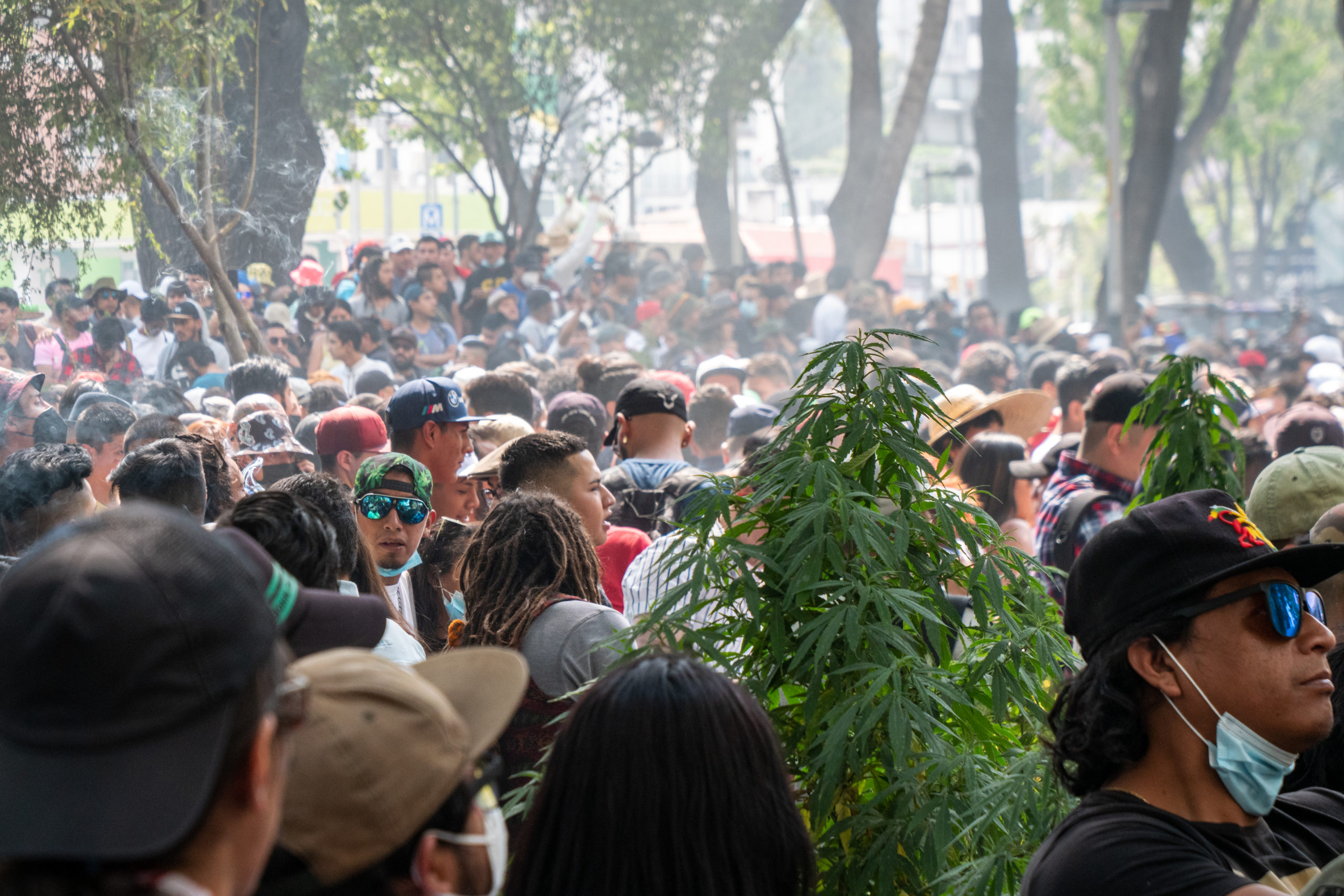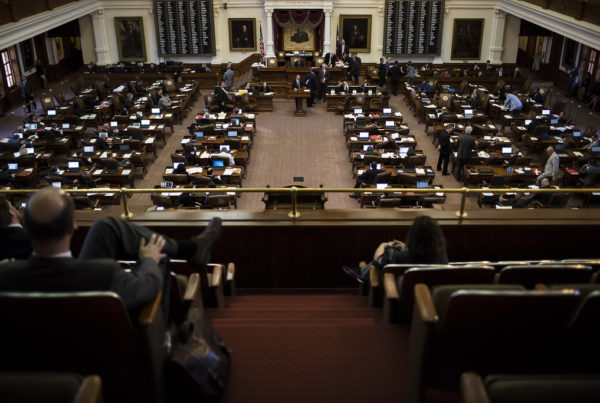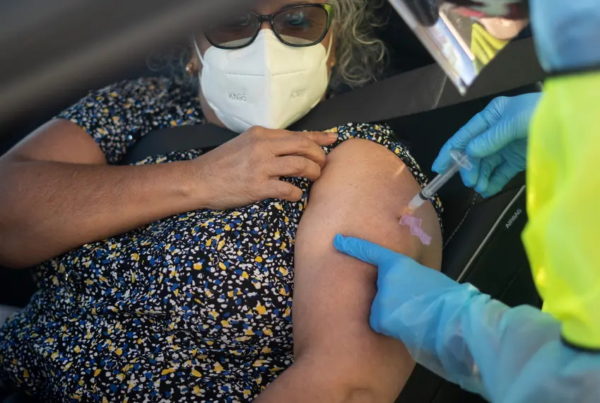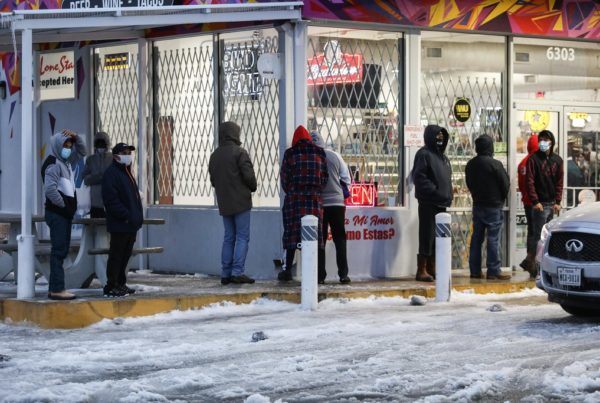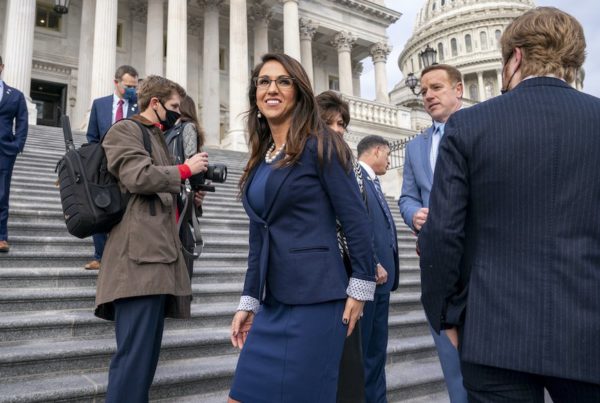Outside Mexico’s Senate building thousands have gathered to protest for legalization of marijuana. It’s 4/20 day, April 20, the day named for the slang term for marijuana. And 10 days before the Mexico Supreme Court’s deadline for a law on legalization to be passed.

A participant at the rally with a 4/20 body painting in support of legal pot.
Now, more than a month later, there’ still no law.
The legalization effort began three years ago when the Supreme Court ruled that a previous law banning the recreational use of marijuana was unconstitutional. But while the lower chamber of Congress signed a legalization bill that also enjoys the support of Mexican President Andrés Manuel López Obrador, and Morena, the ruling party, the measure to turn the country into the world’s largest legal marijuana market seems stuck.
Zara Snapp is from the Instituto RIA, an organization focused on drug policy reform. But even though she supports legalization she’s not in favor of the current bill. Snapp says the original bill promised to prioritize the creation of a local market controlled by indigenous communities and small producers.
“There was also, for example, restrictions on the number of dispensaries that a single business could own. We see this as positive because we don’t want it to be the same business on every single corner selling,” she said.
Snapp says the current version of the bill favors bigger industry players.

A woman wearing a cannabis plant costume at the rally in front of the Mexican Senate. Photo: Antonio Cueto
And instead of creating a new department to regulate the chain of production, distribution and consumption, as it was first proposed by the Senate, the current version leaves it up to the National Commission Against Drug Addiction, which Snapp says is not prepared to do this.
The bill in its current form limits adults age 18 and over to 28 grams of marijuana – that’s less than a half a pound. Carrying more could mean the equivalent of a $500 dollar fine, or six years in prison if it exceeds 200 grams. Those who register for a license can grow a maximum of six plants; growing more could mean up to 10 years in jail.
Back at the Senate, leaders from different pro-weed collectives, like Pablo Alfa Herrera from Asamblea Cannabica + Conciencia – T.V., give fiery speeches in Spanish that echo some of Snapp’s criticisms. (Texas Standard translated part of his speech in English, in the paragraph below.)
“What the legislation is proposing is not what the Supreme Court mandated. They declared that we are free, that it’s not a crime anymore to smoke weed or carry it,” Alfa said.
Alfa says the proposed legislation isn’t honoring the Supreme Court’s mandate.
Alfa also worries that the proposed licensing process will give police a way to harass users. He says activists don’t want a database of users that they fear could be used against them.
Mario Gonzalez Franyutti agrees with Alfa. He’s a retired litigation lawyer who now lives in Queretaro where he grows fruit trees, vegetable crops – and also weed for himself. (Gonzalez’s words were also translated into English, below.)
“My intention will never be to ask for authorization. I’ll just continue to grow the way I’ve been doing, and unless the rules change from what they’re proposing, I don’t pretend to ask for any type of authorization,” he said.
Gonzalez grows six to eight plants a year, which hugs the limit under the law – just enough for himself and to give some to friends and family. He’s worried authorities will abuse a registration system to extort him.
“It’s just opening oneself for supervisors to extort us, and telling the authority that we are marijuana consumers. I don’t have a lot of trust in the state for me to give them the opportunity to extortion me and give them their legal commodities,” he said.
But though there are problems with the current proposals, some, including Snapp with the Instituto RIA, are especially frustrated with the legal limbo.
“We know that there are improvements to the bill that must be made. However, we also have been in this process for quite a long time and we’d like to move to the next scenario because every day that we wait is another day where people are being persecuted, detained, prosecuted, and where communities are being marginalized and oftentimes displaced,” she said.
If the Senate’s special session fails and another extension is requested, Snapp says another way to legalize weed could be another Supreme Court decision.
“If the Supreme Court wanted to, it would retract the case again. One of the ministers would write up a general declaration of unconstitutionality,” she said.
That would require eight of 11 Supreme Court votes to pass. But it’s unlikely to happen because Mexico awaits very important legislative elections in June, and the Court likely won’t want to get involved in what’s been a very prominent political issue.


